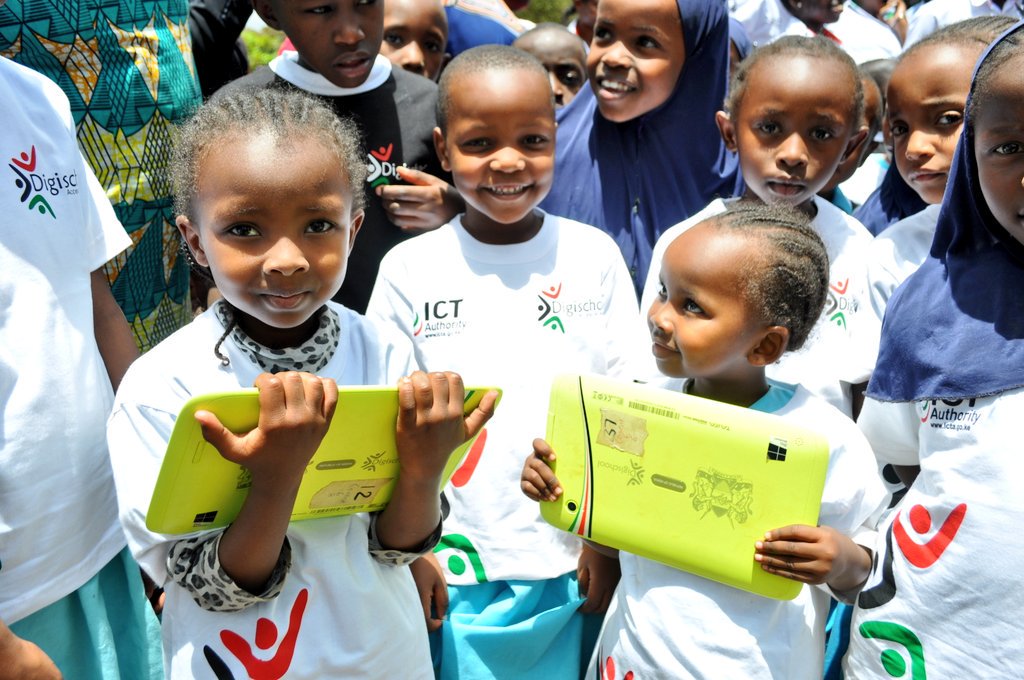The investment and use of new optical mark reader machines to evaluate the 2017 Kenya Certificate of Primary Education (KCPE) by the Kenya National Examination Council (KNEC) and the subsequent release of the exam results in record time has left many pundits asking what would happen if technology was also deployed to help teachers cover the syllabus. Would it have a significant impact like as has in exam marking?
Although the government’s digital literacy project beneficiaries in the pilot phase are not sitting the national exam just yet, research already indicates that using technology to support instruction improved student outcomes in language, arts, math, social studies, and science.
A recent study conducted in New York City on the impact of technology in learning, focusing on remedial and low-achieving students, showed gains of 80% for reading and 90% for math when computers were used to assist in the learning process. Multimedia instruction models, aided by digital learning, were found to save more time by up to 30% compared with conventional teaching methods such as board and chalk as predominantly used in Kenya. Technology also improved achievement and cost savings of 30 to 40%, and had a direct positive link between the amount of interactivity provided and instructional effectiveness.
Other studies have revealed that students using technology as an education tool become more engaged in the process and more interested in growing their knowledge base — in some cases, to the point that they don’t even realize they’re actively learning. Likewise, research has demonstrated that interactive solutions boost retention rates and test scores, being far more engaging and memorable than voluminous textbooks.
Online and high-tech programmes have not only been found to provide better context, a greater sense of perspective, and more arresting activities that allow them to better connect with students, they also frequently offer a more interesting and involving way to assimilate information.
Most importantly, digital learning has been found to offer an unprecedented ability to provide educational experiences that are tailor-made for each student. Thus, by embracing digital devices and connected learning, classrooms around the country and around the globe can not only connect to one another to share insights but also boost learning, experience and communications skills.
Indeed, the government and the private sector can help unlock the potential in digital learning in Kenya by providing first class, affordable computer systems and digital access to content, textbooks, videos, audio and training materials in both private and public schools. It is important to mention that both sectors stand to benefit immensely as the rise in the quality of education means more qualified graduates available in the job market.
Smart schools
Last year, the Kenyan government piloted its digital literacy programme with 11,000 schools. Although not much information is available on the current impact of the devices supplied to the schools, preliminary media reports indicated increased class enrollment, reduced absenteeism and high interactivity between the teacher and the students all of which are crucial elements for effective learning in schools.
Through its Smart School and Solar-Powered Internet Schools (SPIS), Samsung Electronics East Africa has similarly observed such patterns in learning institutions including better exam performance for children who have benefitted from these two programs. To date 33 Solar-Powered Internet Schools (SPIS), 27 eLearning Centres, 22 Smart Schools, 12 Engineering Academies and eight Digital Libraries have been launched across Africa.
The Smart School is an integrated platform consisting of learning software and real-time content sharing features that provide an opportunity for interactive engagement with both teachers and students. Designed specifically to address education challenges in more rural areas with no electricity connection, the Samsung’s SPIS is equipped with tablets, an electronic smart board, a sever, solar panels and Internet connectivity.
The company started promoting the digital learning initiative in the East African region back in 2014 at Arap Moi Primary School in Rongai. It has also provided 200 tablets, pre-installed with over 1500 reading books in both English and Kiswahili in four different schools in Kenya, two in Tanzania and another two in Uganda.
Related: Expect robo-journalism in 2018, Reuters survey predicts
The impact already created through the Samsung-funded initiative and the Kenyan government digital learning programme is quite promising and creates a need to integrate ICT in the entire school processes so as to enhance the teaching and learning experience between teachers and students respectively.
In this contemporary society it important that all education stakeholders, including the private sector, pull in one direction to ensure that ensuring every Kenyan child is able to access quality education, no matter their location – be it a rural area that lacks infrastructure or perhaps in an existing infrastructure that lacks educational resources – with the ultimate aim of actualising the UN Sustainable Development Goals, more specifically the fourth goal on quality education and goal number one on poverty eradication.
The desire to continue inspiring a passion for learning is what keeps Samsung committed to improving the quality of education in Africa through its smart schools and learning centres. The firm has been working closely with educators around the world to improve learning experiences for students by facilitating, a limitless classroom environment that gives students access to a world of knowledge from their desks.













Leave a comment